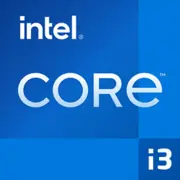Intel Core i3-3210

Intel Core i3-3210: Outdated but Alive. A Complete Review of the Processor for Budget PCs in 2025
(April 2025)
Introduction
The Intel Core i3-3210 processor, released in 2013, is still found in budget builds and office PCs today. Despite its age, it can be purchased on the second-hand market for $10-20, making it an interesting option for budget-conscious users. But is it worth considering in 2025? Let's dive into the details.
Key Specifications: What's Inside?
Architecture and Manufacturing Process
- Codename: Ivy Bridge (3rd generation Intel Core).
- Manufacturing Process: 22 nm — a significant advancement for 2013, but today such chips are considered archaic (modern processors use 5-7 nm).
- Cores and Threads: 2 cores / 4 threads thanks to Hyper-Threading. Multitasking is limited: simultaneous work in a browser, office applications, and background programs is possible, but may experience delays.
- Clock Speed: 3.2 GHz (no Turbo Boost).
Performance
- Geekbench 6: Single-Core — 500, Multi-Core — 971. For comparison, the budget Intel Celeron G6900 (2023) scores 1500/2500 points.
- Cache: L3 — 3 MB. This is sufficient for simple tasks, but not for caching complex data (e.g., rendering).
Integrated Graphics
- Intel HD 2500: Supports DirectX 11, resolutions up to 2560x1600. Suitable for:
- Viewing Full HD videos.
- Light gaming: Minecraft (30-40 FPS on low settings), CS:GO (20-30 FPS).
- Does not support modern AV1 codecs — streaming 4K will lag.
TDP and Heat
- 55W: Low power consumption allows for compact cooling systems (e.g., Cooler Master Hyper H410R, $15).
Compatible Motherboards: What to Look For?
Socket and Chipsets
- Socket: LGA 1155. No new boards have been released since 2014. Options include:
- Budget: ASUS P8H61-M LE (around $30-40 used).
- Enhanced features: Gigabyte GA-Z77-D3H (used $50-70) — supports overclocking and SSDs via SATA III.
Recommendations
- Check the BIOS version: some boards with H61 chipsets require updates to work with Ivy Bridge.
- Avoid boards with bulging capacitors — a common defect in older models.
Memory: Only DDR3
- Type: DDR3 (not DDR4/DDR5!).
- Frequencies: Up to 1600 MHz.
- Recommended Capacity: 8 GB (2x4 GB). For example, Kingston HyperX Blu (used $15-20).
- Limitation: More than 16 GB does not make sense — the processor will not unlock potential.
Power Supply: Minimum Cost
- Power: Even with a GTX 1050-level graphics card (75W), a 400W PSU is sufficient.
- Examples:
- For a PC without discrete graphics: EVGA 400W (new $35).
- With some headroom: Corsair CX450 (new $55).
- Tip: Avoid no-name PSUs — the risk of failure is higher.
Pros and Cons: Who is it Relevant For?
Advantages
- Price: Cheaper than a cup of coffee on the second-hand market.
- Energy Efficiency: Suitable for media centers or mini-PCs.
- Simplicity: Does not require advanced cooling.
Disadvantages
- Outdated Architecture: Lacks support for AVX2, PCIe 3.0, USB 3.1.
- Weak Multi-Threading Potential: 4 threads are not sufficient for video editing or streaming.
- Low Graphics Performance: Even YouTube in 4K will lag.
Use Cases: Where Can It Still Survive?
1. Office PC: Word, Excel, a browser with 5-7 tabs.
2. Home Theater: Kodi player + Full HD videos.
3. Entry-Level Server: NAS for file storage (based on OpenMediaVault).
4. Educational PC: For school projects or learning programming (Python, Scratch).
Real-World Example: A user assembled a PC with i3-3210 + 8 GB DDR3 + 240 GB SSD for $70 (used parts) — the system runs Linux Mint for educational purposes.
Comparison with Competitors
AMD A8-5600K (2012)
- Pros: 4 cores, better at multi-threaded tasks.
- Cons: TDP 100W, Radeon HD 7560D graphics are weaker in games.
Intel Pentium G4560 (2017)
- Pros: Supports DDR4, higher IPC (Geekbench 6 Single-Core difference — 700 vs 500).
- Cons: On the second-hand market, it costs $25-30.
Assembly Tips: How to Avoid Problems?
1. SSD is Essential: Kingston A400 240 GB ($20) will eliminate "freezes" during OS loading.
2. Don't Chase Graphics Cards: Even a GTX 1650 would be overkill — the processor will become a bottleneck.
3. Optimize the OS: Windows 10 LTSC or Linux (Lubuntu/Xubuntu).
4. Check RAM Compatibility: Some boards do not work with memory above 1333 MHz.
Conclusion: Who is the i3-3210 Suitable for in 2025?
This processor is a choice for:
- Enthusiasts building PCs from spare parts.
- Budget offices where performance is not a requirement.
- Parents looking for a budget computer for their child.
Why not? If comfortable web browsing with several tabs, working in Photoshop, or gaming after 2015 is needed — it's better to add $50 and get a used Core i5-4570 or Ryzen 3 2200G.
Final Thoughts
The Intel Core i3-3210 is an example of a "veteran" that can still serve in specific scenarios. Its time has passed, but it remains an option for ultra-budget projects. Remember: such a build is a compromise between price and comfort. Choose wisely!
Basic
CPU Specifications
Memory Specifications
GPU Specifications
Benchmarks
Compared to Other CPU
Share in social media
Or Link To Us
<a href="https://cputronic.com/en/cpu/intel-core-i3-3210" target="_blank">Intel Core i3-3210</a>